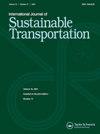我真的愿意可持续地使用电动汽车吗?关于电动汽车用户充电偏好的研究
IF 3.9
3区 工程技术
Q2 ENVIRONMENTAL STUDIES
International Journal of Sustainable Transportation
Pub Date : 2024-09-01
DOI:10.1080/15568318.2024.2399783
引用次数: 0
摘要
由于在大多数国家,电力无法在系统层面进行有效和实际的储存,因此在高峰时段为电动汽车充电意味着必须产生额外的能源(几乎完全依赖化石能源),以满足该时间窗口的额外需求。本文报告了一项 SP 研究的结果,在这项研究中,电动汽车车主可以选择在家中(以固定的已知价格)或在充电价格可变的公共充电站(以及电动汽车充电的其他特点)为其电动汽车充电。行为实验的结果表明,电动汽车用户非常愿意接受其他补偿措施,以避免在高峰时段为电动汽车充电,而小额金钱奖励、更短的使用时间、有保障的充电地点或快速充电都能有效促进充电模式向更可持续的行为转变。本文章由计算机程序翻译,如有差异,请以英文原文为准。
Am I really willing to use my electric vehicle sustainably? A study on the charging preferences of electric vehicle users
As, in most countries, electricity cannot be efficiently and practically stored at a systemic level, charging EVs during peak hours implies that additional energy has to be generated (relying almost exclusively on fossil sources) to cover the additional demand during that time window. This article reports the results of an SP-study, in which EV-owners were confronted with the option of charging their EVs at home (for a fixed known price) or at a publicly accessible charging station with charging price variability (as well as other features of EV charging). The results of the behavioral experiment show that EV-users exhibit a high willingness to accept alternative compensations for not charging EVs during peak-hours and that small monetary incentives as well as shorter access times, a guaranteed charging place, or fast charging could all efficiently promote a shift in the charging patterns toward a more sustainable behavior.
求助全文
通过发布文献求助,成功后即可免费获取论文全文。
去求助
来源期刊
CiteScore
8.90
自引率
2.60%
发文量
56
期刊介绍:
The International Journal of Sustainable Transportation provides a discussion forum for the exchange of new and innovative ideas on sustainable transportation research in the context of environmental, economical, social, and engineering aspects, as well as current and future interactions of transportation systems and other urban subsystems. The scope includes the examination of overall sustainability of any transportation system, including its infrastructure, vehicle, operation, and maintenance; the integration of social science disciplines, engineering, and information technology with transportation; the understanding of the comparative aspects of different transportation systems from a global perspective; qualitative and quantitative transportation studies; and case studies, surveys, and expository papers in an international or local context. Equal emphasis is placed on the problems of sustainable transportation that are associated with passenger and freight transportation modes in both industrialized and non-industrialized areas. All submitted manuscripts are subject to initial evaluation by the Editors and, if found suitable for further consideration, to peer review by independent, anonymous expert reviewers. All peer review is single-blind. Submissions are made online via ScholarOne Manuscripts.

 求助内容:
求助内容: 应助结果提醒方式:
应助结果提醒方式:


